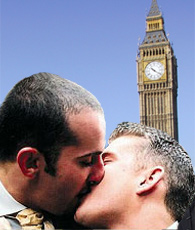A law against "promotion" of homosexuality was removed from the British statute books on Thursday, after more than a decade of protests by gay rights groups, reports the Associated Press.

The measure was introduced under Conservative Prime Minister Margaret Thatcher in 1988 to deal with concerns over homosexual content in sex education. The law banned local authorities from funding or allowing books, plays, leaflets, films or any other material showing gay relationships as normal.
Local-authority-produced literature about homosexuality has however been freely available as a loophole effectively lifts the ban on anything intended to prevent disease, including of course, AIDS.
Although the law has not been used to prosecute, equal rights campaigners however say that the repeal is an important milestone in a series of measures it is taking to tackle discrimination on the grounds of sexual orientation.
"Today's repeal of Section 28 is a triumph for 21st-century tolerance over 19th-century prejudice," said Ben Summerskill, chief executive of gay justice group Stonewall.
The government welcomed the law's disappearance. Government officials said the law inhibits staff in local authorities, which run many schools and colleges, from counselling gays and lesbians, and makes it difficult for teachers to stop people from bullying homosexual students.
Local Government Minister Nick Raynsford said: "For over a decade, Section 28 has cast a cloud of confusion and ambiguity over local authorities' ability to support and provide services to the whole of their community. Repeal means that this cloud has lifted."
"The government is pleased that Parliament has taken advantage of this opportunity to remove this unnecessary and offensive piece of legislation - which has fuelled prejudice and stigmatised homosexuality - from the statute book," he added.
Prime Minister Tony Blair's Labour Party promised voters the repeal of Section 28 when they campaigned against the Conservatives in 1997.
